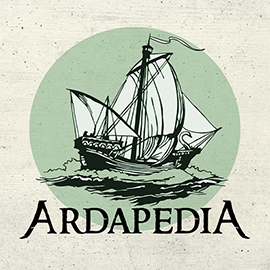Narmacil II.: Unterschied zwischen den Versionen
Aus Ardapedia
K (HoME-Link. (mehr Infos)) |
|||
| Zeile 19: | Zeile 19: | ||
== Sonstiges == | == Sonstiges == | ||
* Das Geburtsjahr wird nur in [[ | * Das Geburtsjahr wird nur in [[The Peoples of Middle-earth]] erwähnt und ist daher nicht völlig verlässlich. | ||
* Der Name '''Narmacil''' ist [[Quenya]] und bedeutet ''Flammenschwert''. | * Der Name '''Narmacil''' ist [[Quenya]] und bedeutet ''Flammenschwert''. | ||
| Zeile 29: | Zeile 29: | ||
* [[Der Herr der Ringe Roman|Der Herr der Ringe]], Anhang A | * [[Der Herr der Ringe Roman|Der Herr der Ringe]], Anhang A | ||
* [[ | * [[The Peoples of Middle-earth]]: The Prologue and Appendices to the Lord of the Rings, VII. ''The Heirs of Elendil'' | ||
* [[Das Silmarillion]]: Anhang, ''nár'' | * [[Das Silmarillion]]: Anhang, ''nár'' | ||
* [[The History of Middle-earth volume V, The Lost Road (and other writings)]]: The Etymologies, ''MAK-'' | * [[The History of Middle-earth volume V, The Lost Road (and other writings)]]: The Etymologies, ''MAK-'' | ||
Version vom 1. April 2008, 14:10 Uhr
Narmacil II. ist in den Werken J. R. R. Tolkiens der 29. König von Gondor.
Zeitangabe
- geboren 1684 D.Z.
- gestorben 1856 D.Z. (er wurde 172 Jahre alt)
- König von Gondor ab 1850 D.Z. (6 Jahre Regierungszeit)
Volk
Beschreibung
Narmacil II. war der neunundzwanzigste König Gondors, der Sohn und Nachfolger Telumehtars. Er starb im Kampf mit den Wagenfahrern. Gondor verlor große Gebiete östlich des Anduin. Die Menschen im Osten und Süden Rhovanions gerieten in die Sklaverei. Nach Narmacil II. wurde sein Sohn Calimehtar König.
Sonstiges
- Das Geburtsjahr wird nur in The Peoples of Middle-earth erwähnt und ist daher nicht völlig verlässlich.
- Der Name Narmacil ist Quenya und bedeutet Flammenschwert.
Externe Links
Quellen
- Der Herr der Ringe, Anhang A
- The Peoples of Middle-earth: The Prologue and Appendices to the Lord of the Rings, VII. The Heirs of Elendil
- Das Silmarillion: Anhang, nár
- The History of Middle-earth volume V, The Lost Road (and other writings): The Etymologies, MAK-
